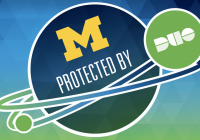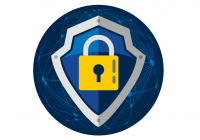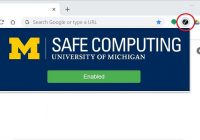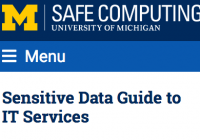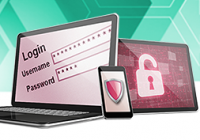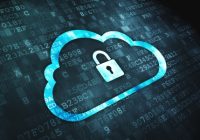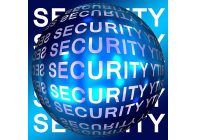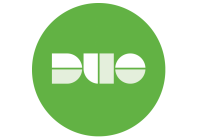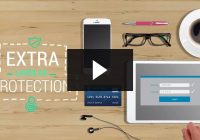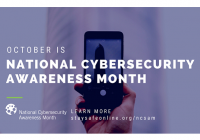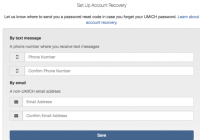Category Archives: Safe Computing
Cryptocurrency mining risks and U-M restrictions
You may not use U-M resources—computers, networks, electricity—for cryptocurrency mining. Such use violates university policy and puts U-M services and data, and your personal accounts and devices, at risk. The Responsible Use of Information Resources (SPG 601.07) policy states that U-M resources may not be used “for personal commercial purposes or for personal financial or other gain.” The… Read More »
Protecting medical devices from cybersecurity threats
Medical devices capable of transmitting health information and connecting to Michigan Medicine’s networks offer improvements to the effective delivery of patient care, but they also may introduce privacy and security concerns. Michigan Medicine’s Information Assurance (IA) program has been raising awareness of these concerns and developing new approaches to address these vulnerabilities. As a major step, Michigan Medicine… Read More »
IA Chrome extension protecting LSA
About 2,100 managed systems in the College of Literature, Science, and the Arts (LSA) now have extra protection from malicious websites thanks to the Safe Computing Website Checker developed by Information Assurance (IA). The extension protects people from some types of malicious websites when browsing the web with Chrome. “Utilizing Group Policy Management (GPO) we have deployed this… Read More »
Only store sensitive data in approved services—check the guide!
Do you work with sensitive data? Any time you are thinking about using a storage or collaboration service for sensitive university data—whether in the cloud or at U-M: Check the Sensitive Data Guide first to see which services are approved for your data type. If the service you want to use is not listed in the guide, ask… Read More »
Check links on your smartphone before tapping
You know about hovering over links in email with your mouse to see the destination URL before clicking. But what do you do on your smartphone or tablet where you don’t have a mouse or trackpad? How do you tell where the link will take you? Press the link and hold down till a dialog box appears. The… Read More »
Did you miss SUMIT 2018? Watch the recorded sessions now
Students show security know-how and win prizes
For the past 14 years, Information Assurance (IA) has engaged UM-Ann Arbor students, including medical students, with an online quiz designed to raise awareness about IT security issues and promote good IT security practices. This year’s quiz resulted in the second highest completion rate yet! From October 29 through November 2 a total of 7281 students participated. This… Read More »
SUMIT 2018 focuses on U-M’s role as a leader in security and privacy research
ITS begins work on CUI proof of concept
The University of Michigan has been working on a effort to ensure that the university is compliant with the new regulations concerning the use of Controlled Unclassified Information (CUI). The next step is to develop a CUI public cloud strategy and proof of concept in AWS. That is where the ITS Cloud Infrastructure Transformation Program (CITP) technical team… Read More »
U-M Information Security policy: Revised and approved
The revised University of Michigan Information Security policy (SPG 601.27) recently was approved, along with a number of new information technology standards. The policy and accompanying standards represent the most comprehensive revision of the institution’s information security program since its inception over a decade ago. SPG 601.27 and the standards are based on a cybersecurity risk management framework that… Read More »
Shop online safely with these tips
The holiday season is just around the corner, and you may be getting ready to do some online shopping. The Safe Computing website offers tips to protect your personal information and devices when you shop online. Secure your environment. Keep devices and accounts secure and choose the safest ways to pay. Know who you are dealing with. What… Read More »
Duo expansion: New app and resources support two-factor for Weblogin
Getting questions about U-M’s move to two-factor for Weblogin for faculty and staff? New and updated materials are available that you can refer people to. The online and print materials are intended to help you prepare for January 23, 2019, when two-factor for Weblogin will be turned on for all faculty, staff, student employees, and sponsored affiliates of… Read More »
Keep your personal software up-to-date
We all should be in the habit of keeping our software up-to-date. This is necessary because vendors and others regularly identify security vulnerabilities in software and apps, and then release updates and patches to fix them. Additionally, keeping your software current enables you to take advantage of other improvements, such as better performance or new functionality. Personal computers… Read More »
Turn on two-factor for your personal accounts
Many popular services and websites offer two-factor authentication. Information Assurance (IA) encourages you to turn it on whenever it’s available to protect your personal accounts. Duo may be an option If you already use the Duo Mobile app for two-factor at U-M, you might be able to use it with your personal, non-university accounts. If a service’s instructions… Read More »
Michigan Medicine announces launch of Michigan Healthcare Security Operations Center
With the launch of the Michigan Healthcare Security Operations Center, Michigan Medicine is among the first in the nation working with four other healthcare organizations to continuously monitor and improve cybersecurity. The MI-HSOC is a group of highly-skilled teams that leverage shared technologies, process, and skills to prevent, detect, analyze, and respond to cybersecurity events. The new shared environment,… Read More »
Participate in National Cybersecurity Awareness Month this October!
Every October, Information Assurance (IA) leads a celebration of National Cybersecurity Awareness Month (NCSAM) by hosting events, sharing tips, and reminding everyone of our shared responsibility to protect and secure university and personal systems and the sensitive information they contain. NCSAM is spearheaded by the National Cyber Security Alliance and the U.S. Department of Homeland Security. This year,… Read More »
Use antivirus software to protect U-M and personal computers
Antivirus software should be installed and kept up-to-date on all of your computers—both your own and those owned by the university. MiWorkspace computers already have antivirus software installed, and it is updated automatically. For U-M computers Information Assurance (IA) recommends these antivirus products that are licensed for use on UM-owned computers: Windows 8 and 10. Use Windows Defender,… Read More »
New prompt starting to collect UMICH account recovery info
If you ever forget your UMICH (Level-1) password, you can efficiently recover your account access as long as you have already completed some simple, advance setup. ITS has long offered a self-service account recovery option, but many users were unaware of the advance setup requirement until it was too late. To address this gap, ITS is adding a… Read More »
Use Duo when traveling
Don’t let travel plans interrupt the protections provided by Duo. Duo offers multiple options to help you complete two-factor authentication when traveling. You may be able to use your regular Duo two-factor option, or you may need to use an alternative, depending on your travel plans. The recommended travel option is the Duo Mobile app on a smartphone… Read More »

